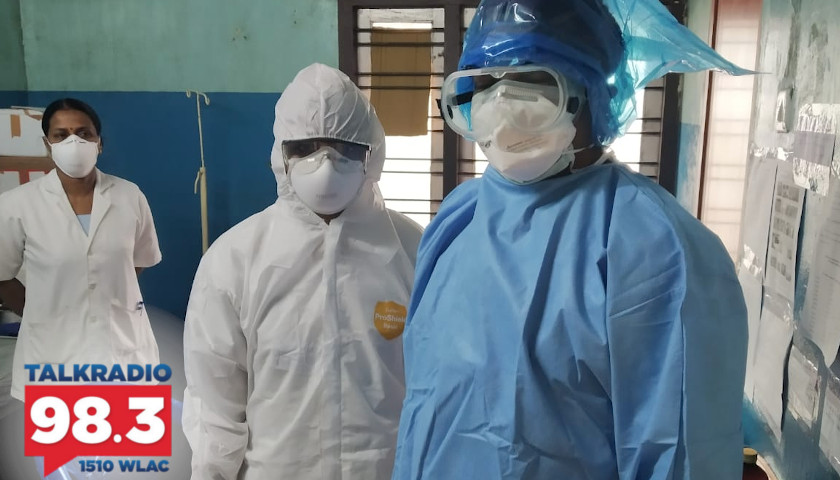Public affairs strategist and all-star panelist Clint Brewer joined The Tennessee Star Report with Michael Patrick Leahy – broadcast on Nashville’s Talk Radio 98.3 and 1510 WLAC weekdays from 5:00 a.m. to 8:00 a.m. – Wednesday morning on the newsmakers line.
At the top of the second hour, Brewer weighed in on how he thought the local and national press was handling the coronavirus pandemic. He compared journalists to first responders saying that their work came with risk and saw good work from the local levels but rated the national press a B- because they were mixing politics with a health crisis.
Leahy: We are joined now by our good friend and a new all-star panelist, Clint Brewer, a public affairs strategist joins us who was here with our election night coverage on Super Tuesday. Clint, good morning how are you?
Brewer: I’m good Mike. How are you? Good morning.
Leahy: Are you safe and are we practicing good social distancing this morning?
Brewer: Well I’m certainly the only one up in my house I can tell you that. (Leahy laughs) I’m at about 70% full caffeination. (Leahy laughs) I’m as prepared for your show as I can be under the circumstances.
Leahy: Clint, you have an extensive background in journalism. You’ve reported for The Tennessean. You were the political editor for some time. You were the managing editor of The City Paper for some time. You know journalism. What’s your grade for journalist reporting in this coronavirus pandemic?
Brewer: Well you know, I think we have to separate the national press from the local press. I think local newspapers across the country are doing an exceptionally good job under the circumstances.
If you look across America at some of the major regional newspapers I think that the coverage has been brave. You have to remember these are local folks too, and they are still getting out in their communities and doing their jobs.
Journalism, if done the right way carries a certain amount of risk with it like a first responder does. Think about natural disasters. To do your job you have to get out and nose. I think there are instances and examples of really brave and exceptional coverage around the country during this period of time at the local level. At the national level you know, overall I think I’d give it like a B-. Some of the entities that are out there are still kind of playing to the left or the right to their natural audiences.
Leahy: Yeah.
Brewer: There are a lot of facts and a lot of reality in the middle between those partisan divides where I think there really is going to be the meat on how we meet this pandemic as a country and how we address it.
I think those options and those realities need to be reported on more and discussed more. It’s time to really for the national press on the left and the right to kind of leave their politics out of it. Let’s get down to the meat of the matter.
Leahy: I think that’s exactly correct Clint. And what we’ve tried to do at The Tennessee Star is we present the evidence. How many people have been tested in the country and by state? How many people have tested positive? How many deaths are there? And what’s the rate of that?
And we’re tracking that very very carefully. My view on this is the best way to provide information to people to evaluate what’s going to happen. I had Steve Bannon on the other day and I asked him, and you know he’s got this War Room Pandemic podcast that’s been out since January 15th warning about this.
Brewer: Right.
Leahy: I asked him how bad is this going to get? How high is the peak going to be? And he really didn’t answer that. He said, we’re taking all of the precautions necessary to limit the spread, but we don’t know. When you look at this, not as a doctor, not as a public health official, neither of us are that, how do you analyze this in terms of how bad do you think this is going to get?
Brewer: Well you know the stories and the information that I’m absorbing the most and reading the most has to do with the systemic limits and problems around the American healthcare system. I’ll just give you an example.
One of the things that I keep reading and it’s a commonality with the national press on the left and the national press on the right. It’s kind of finding that fact in the middle. We don’t have enough of the face masks or protective gear. (Chuckles) These are not respirators. These are not hospital beds or rooms.
These are not things that are high dollar items. They are just simply from a manufacturing standpoint. We don’t have enough thin paper and plastic whatever they are made up of. Masks and gowns that healthcare professionals need to wear in order to treat a coronavirus patient and remain healthy themselves, so they can treat the next coronavirus patient.
Leahy: That seems like a problem that could be readily fixed.
Listen to the full second hour:
– – –
Tune in weekdays from 5:00 – 8:00 a.m. to the Tennessee Star Report with Michael Patrick Leahy on Talk Radio 98.3 FM WLAC 1510. Listen online at iHeart Radio.





